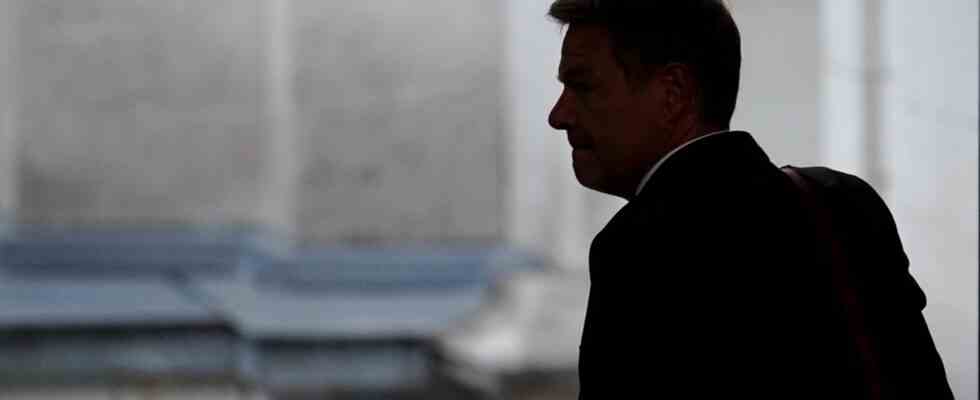analysis
Status: 09/22/2022 11:36 a.m
Economics Minister Habeck has had better days. At the beginning of his term of office, the Green was even well received in business. In the meantime, the relationship has cooled noticeably.
That sounded unexpected from the mouth of a Green politician: “We have to trust that the efficiency of the market will bring forward the cheapest and most innovative technologies.” Robert Habeck very consciously followed the tradition of Ludwig Erhard after taking office as Economics and Climate Minister. Habeck not only praised the creativity of the markets, but also warned against constant new subsidies. They are merely the “ultima ratio of economic policy”.
This was well received by entrepreneurs and advocates of the social market economy. At large conferences – whether at the Federation of German Industries (BDI) or even at the Economic Council of the CDU – Habeck was able to score points with his open communication and hands-on manner. Of course one could complain about how big the challenges are. But he would rather look for solutions together with the economy, especially for the combination of economic success and climate protection. Entrepreneurs who are politically more attached to the CDU/CSU or FDP also applauded.
Habeck first impressed …
Entrepreneurs were also impressed by the fact that Habeck quickly began promoting alternatives to Russian gas after Russia invaded Ukraine. First the quick approval of LNG terminals and then the willingness to replace gas with coal – and against resistance in their own ranks.
But with the ever-increasing energy prices, the relationship between Habeck and business has cooled off significantly. It is often said that many things are announced but not implemented. “We’d like to save gas,” Daimler Truck Board member Martin Daum told the FAZ, “but we can’t.” The possibility of replacing gas with oil – experts talk about the fuel switch – is associated with such major hurdles when it comes to approval that it has not yet been possible to implement it: The approval processes lasted no less than a year, Daum complains.
… and soon disappointed
Reinhold von Eben-Worlée, the president of the “Family Entrepreneurs” association, has similar reports. Much of what Habeck promised, such as speeding up the approval process and reducing bureaucracy, he has not kept to this day: “Here his ministry is simply too slow and he is too lazy.”
Frustration has not only built up among family entrepreneurs. Many business representatives are wondering whether Habeck has understood the seriousness of the situation. His statement that there is a chance of getting through the winter well despite the lack of gas supplies if a lot is saved and you are “a bit lucky with the weather” causes a lack of understanding.
There is nothing more important than stabilizing the energy sector, says Reinhold von Eben-Worlée. Politicians must do everything they can to bring energy prices down and ensure energy availability: “We need all forms of energy, both coal and nuclear power, to ensure that.” It is very similar in a resolution of the DIHK: All available power plants must be connected to the grid – “without ifs and buts”.
Little understanding of “reserve operation”
Understanding of Habeck’s vote for a so-called “backup operation” of two southern German nuclear power plants? None in the economy. BDI President Siegfried Rußwurm had already warned in the summer: “There’s a blaze of fire.” Now urges you to think again about longer operation of the nuclear power plants. A one-off extension with new fuel rods would produce just 1.3 percent more nuclear waste, says Rußwurm morning magazine from ARD and ZDF. In order to lower electricity prices, all electricity that can be produced must be produced. In the current situation, shutting down three base load capable nuclear power plants is “damn brave,” said Rußwurm.
The fact that almost nothing has been provided for them in the previous relief packages is also causing disappointment in the economy. On the contrary: the gas surcharge hits the economy with full force, and the planned reduction in VAT on gas usually does not relieve companies.
The expansion of energy aid to small and medium-sized businesses that has been announced in the meantime must come as soon as possible, warns the President of the Craft Industry, Hans Peter Wollseifer. You need immediate help within a very short time: “If the help does not reach us until sometime next year, then there will no longer be many thousands of businesses in the trades.”
In background discussions, entrepreneurs refer not least to Habeck’s unfortunate contribution to the program “Maischberger” two weeks ago. They shake their heads at the idea that companies could survive in the long term if they were no longer able to produce in the short term due to high energy prices. It seems that something needs to be done to mend the ailing relationship between business and the minister.
The Economy and the Minister – History of an Alienation
Hans-Joachim Vieweger, ARD Berlin, September 22, 2022 at 12:20 p.m

